#lacan unconscious
Text
Trauma’ is a term that has long been used in medicine and surgery. It comes from the Greek τϱαŭμα, meaning wound, which in turn derives from τιτϱοσχω, to pierce.
‘Trauma’ is a term that has long been used in medicine and surgery. It comes from the Greek τϱαŭμα, meaning wound, which in turn derives from τιτϱοσχω, to pierce. It generally means any injury where the skin is broken as a consequence of external violence, and the effects of such an injury upon the organism as a whole; the implication of the skin being broken is not always present, however–we may speak, for example, of ‘closed head and brain traumas’.
In adopting the term, psycho-analysis carries the three ideas implicit in it over on to the psychical level: the idea of a violent shock, the idea of a wound and the idea of consequences affecting the whole organisation.
Laplanche, J. and Pontalis, J.-B. (1973) The Language of Psychoanalysis. London: Hogarth Press – Reprinted by Karnac Books 1988
#lacan#psychoanalysis#unconscious#jouissance#lacanian real#freud#lacan unconscious#lacan object petit a desire#real symbolic imaginary#objet petit a#trauma#Laplanche Pontalis#wound#real
96 notes
·
View notes
Quote
I am in favor of John and his “In the beginning was the Word,” but it is an enigmatic beginning. It means the following: for the average Joe—for this carnal being, this repugnant personage—the drama begins only when the Word is involved, when it is incarnated, as the true religion says. It is when the Word is incarnated that things really start going badly. Man is no longer at all happy, he no longer resembles at all a little dog who wags his tail or a nice monkey who masturbates. He no longer resembles anything. He is ravaged by the Word.
From The Triumph of Religion by Jacques Lacan (quoted in ‘Jacques Lacan's Benedict Option’ by Chase Padusniak)
#lacan#psychoanalysis#god#big Other#god is unconscious#atheism#the lack#lack#the word#la langue#la parole#la mot#John#John's gospel#Christianity#Catholicism#faith#religion#god is dead#father#the Law
14 notes
·
View notes
Text
youtube
#jacques lacan#psychoanalysis#human science#psychology#sigmund freud#ferdinand de saussure#unconscious#linguistics#phoneme#Youtube
1 note
·
View note
Text
Alien Culture and Contemporary Paranoia
I wonder if you remember the late-’90s pop culture craze around aliens and UFOs. Movies, TV shows, and video games often referred to them. T-shirts, stickers, coffee mugs—bearing levitating discs and/or little green guys with huge black, often upside-down teardrop-shaped eyes—sold by the millions (one supposes). They often entailed foil and/or holograms. In magazine stands at grocery stores,…

View On WordPress
#Aliens#Anxiety#Conspiracy Theories#Conspiracy theorism#Cultural politics#Fascism#Fear#Franz Neumann#Lacan#Paranoia#Philosophy#Political theory#Politics#Politics of emotion#Psychoanalysis#Psychology#The collective unconscious#The political unconscious
1 note
·
View note
Text
Analysts rushing to interpret may actually be analysts resisting a plunge into the depths of what indeed needs analysis... Or as Lacan puts it, "There is only one resistance, the resistance of the analyst. The analyst resists when he doesn’t understand what he is dealing with. He doesn’t understand what he is dealing with when he thinks that interpreting is showing the subject that what he desires is this particular sexual object.” (Seminar II, p.228).
1 note
·
View note
Text

“children between the ages 6 and 18 months, identify with their image in a mirror and that this gives the child the jubilant perception of itself as whole and complete, in contrast to the child’s inner experience of being fragmented and disconnected.”
Jacques Lacan
0 notes
Text
About Loid Forger's therapy in SxF manga chapter 77
(Spoilers ahead)
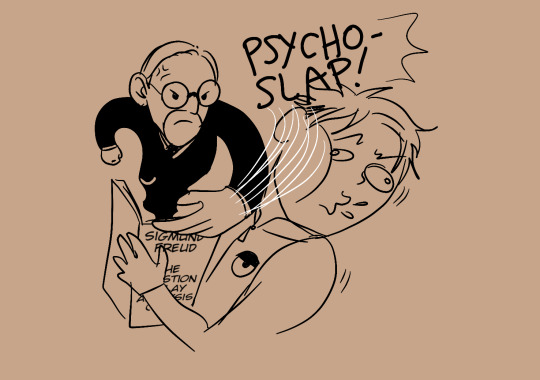
There's a Freudian text for everything. Today's all about The Question of Lay Analysis (1926), also known as Wild Analysis.
Endo did what I have been planning to do for a comic of my own: depict Loid actually working as a Psychiatrist. While I'm glad he took this path, sadly I can't say he did a good job on it.
As some of you know, I'm a therapist grounded in Psychoanalitic Theory. Yes, I like Freud and Lacan, and no, Oedipus Complex is not what you heard it is. I did a brief analysis of Psychiatry stuff in SxF in the past, and today I feel compelled to repeat that exercise.
Let's go in order.
1. The importance of being a third party

What's the reason for which people ask a therapist for help, and not their families or friends? What do we have that they don't?
The answer is pretty simple: neutrality. We don't have a side other than rationality and ethics. A good therapist should be able to listen to his patient without losing objectivity.
When you and your patient have a shared, unique shared experience, it's preferable, even ethical, to refer him to another therapist, in order to preserve the higher interest of the patient. The more neutrality you can muster, the better for the curing process. Otherwise, it's really hard to listen to someone else without being constantly reminded of yourself. It turns into a blind spot.
Now, there are exceptions to this rule, but you must handle them carefully, and always putting the patient at the center. Loid openly talking here about how close he is to the hijacking incident doesn't help much.
In short, you have to ensure that your position in the therapeutic process remains an impartial, neutral Other, and avoid becoming a fellow. It's good to create trust, but not too much, just enough to work.
2. Chronic condition (?)
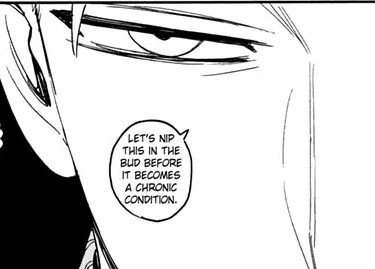
The biggest difference between a Psychiatrist and a Psychologist is that the first went to Med School. Hence, chronicity is a term that applies mostly for organic conditions, but it's rare in the field of subjectivity.
In my short experience, I've met cases labeled as "chronic depression" being cured. I, myself, cured a case of "compulsive suicide attempts since 15 years old, chronic depression, started hearing evil voices 2 weeks ago". You might think that I'm a great therapist, but it's not the case; it's just that, in order to tackle subjective problems, you ought to go to the root of the symptoms and deal with the subjectivity you find there. Psychoanalitic therapy has proven to be wonderful to treat many conditions that didn't get a cure in other types of psychotherapy.
Of course, it's not a panacea. There are things that we can't figure out yet. But bear in mind that chronicity, in the field of the mind, is more complex than just the passage of time and only a bunch of mental conditions truly admit it.
Jacques Lacan, the most important psychoanalist after Freud, said that the unconscious's track of time is not chronological, but logical. You don't just jump out of adolescence because you turned 18; other things need to happen for you to finally feel like an adult. It's a logical progression. The same can be said about some "chronic" conditions.
3. Explicit Reason of Consultation vs Latent Reason of Consultation
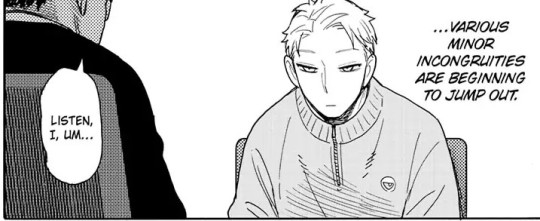
A.K.A Everybody lies.
Psychotherapy is a really weird thing to learn and master. In Psychology School they teach you that you must trust what your patient tells you, but at the same time, distrust him enough. How to conceal both things?
Well, everything is easier when you take Dr. House's words to heart.
Everyone states a reason for consultation, but that first reason is never the real reason, no matter how reasonable it might sound. The trick to discern what the latent, real reason for consultation is, is to determine what the subjective conflict hiding in plain sight is. Sometimes there isn't any and therefore, a full psychotherapy is not necessary (maybe just assisting someone with some things, being there just in case, etc), but most cases are built upon a conflict.
I'm glad that Loid here decided to act like a good Psychiatrist and took a mental note on the oddities.
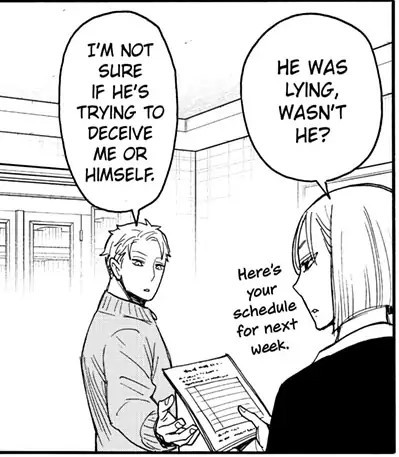
WELL SAID MY BOY, I'M PROUD OF YOU
I want to remark this, because it's discouraging how many therapists oversee this to simplify their job to an extreme. Believe it or not, there are therapists out there that act upon what their patients tell them first. "Hi doc. I came here today because I got an accident and I think I have PTSD". "Ok, I'll have you practice these mindfulness excercises and you should be ok within a month, see ya". DUDE.
4. The place of truth in the context of Psychotherapy
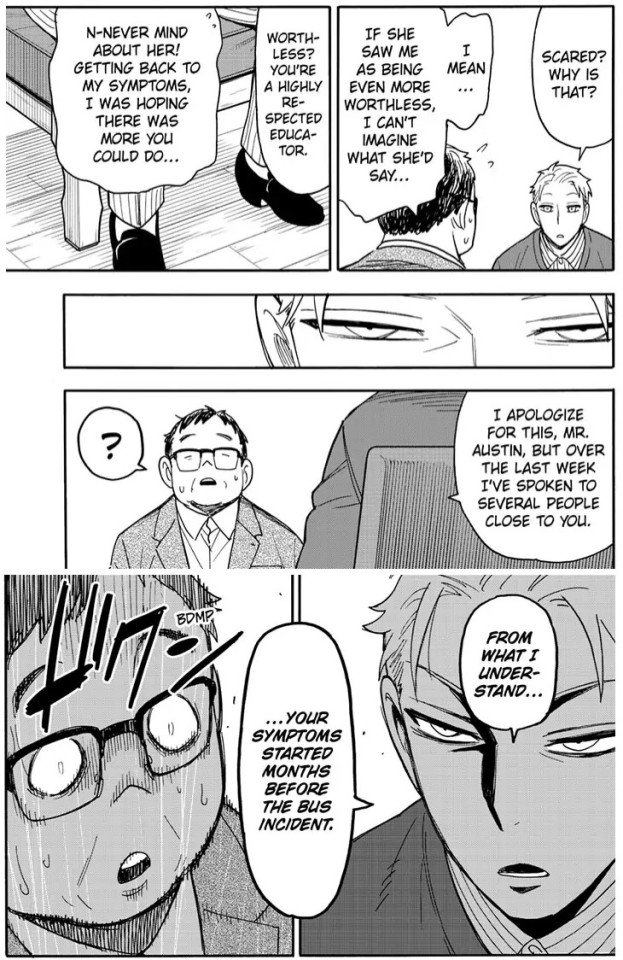
Ah, the classic temptation of knowing the 'real' truth. Is this patient in front of me bullshitting his way out? Is he in a delirium? Is she telling the truth, or just embellishing her story to make it more believable?
You don't have this struggle once you are certain of your role as a psychotherapist. And your role is to help your patients to deal with their subjective struggles.
In short: Psychoterapy deals with the patient's truth, not with the 'real' truth.
You know who deals with 'real' truth in the field of Mental Health? Social Workers.
We psychotherapists don't need to ascertain our patient's claims. Confronting them with reality usually proves to be fruitless, just like Loid did here ("But you're a respected educator!"). It's way more useful to open the topic by asking more questions such as "How did you reach that conclussion?" "What made you think that way?", or giving a specular answer ("You speak like someone else said that about you", "You're too hard with yourself. Where does that come from?", "It sounds like you're belittling your fear for what your wife could say", etc etc etc).
Whenever you're with a neurotic patient, their own personal truth is the only truth you need to work with. Leave the 'real' truth for people who actually needs it, like Social Workers, Doctors or Judges. Your role with a patient is to make sure that his personal truth can turn into something less painful. No need to talk with their friends and family for info, unless your patient is a child or a teenager; just ask him and stick to what he says word by word.
There's a huge topic about the place of reality in therapy, specially in the field of Psychoanalysis, but if I start this train of thought I'm afraid I'll go down to Hell. If you're interested, I've reblogged some Lacanian pills on this Tumblr, check them out by searching the tag #lacan.
PS: NO LOID, DON'T DO THAT. DON'T BREAK THE TRUST YOU ACHIEVED WITH MR AUSTIN! CONFIDENTIALITY IS A MUST!!
5. Counceling = Psychotherapy?

Loid is a (fake) Psychiatrist, not a psychotherapist, so I can't be too hard on him. Also I stan this man. I'm painfully well aware that councelling and coaching is an alternative to psychotherapy in other parts of the world, mostly in the US. But let's not forget one thing:
Psychotherapists DON'T GIVE ADVICES.
At least, not the ones that take this job seriously.
Everyone can give advices. Do you want an advice? Ask your family or friends, or post something in social media, or ask a complete stranger in the street what to do. You'll get plenty of answers and advices. Maybe a bunch of them will be really useful. Good!
The thing with advices is that:
-They act like a universal recipe for a problem
-There's no universal recipe to sort a problem
-They don't tackle the subjective root of a problem
-They assume that the problem can be solved by something you can do upon your surroundings, when the real struggle stems from subjective problems
Some advices do help with real struggles, but when you have a subjective conflict, they barely help; hell, sometimes they make everything worse.
Like Loid here.
Remember when I mentioned that the unconscious mind's track of time is not chronological, but logical? This is a great example. Mr Austin won't be able to properly talk with his wife just because Loid adviced him to; he must solve other issues before that.

I'm glad we're on the same page on this one
6. Your therapist is not your friend
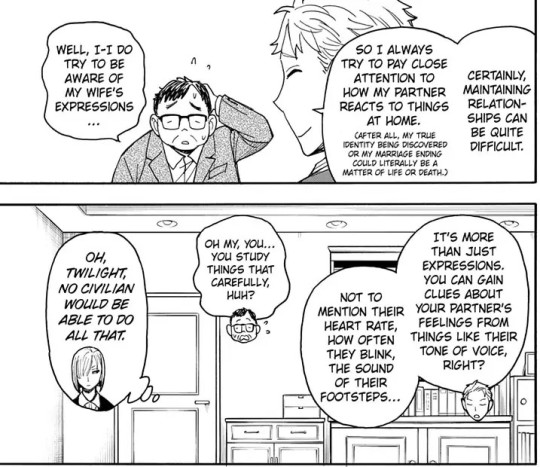
Sad but true.
If your therapist is good enough, you won't know many things about his private life. You won't know about his lover, his hobbies, where does he live, what does he fear.
Why the secretism? Because it's useless for the patient. Also because disclosing personal information has the effect of becoming a model for the patient, who would start to imitate you. And finally, because you need to mantain a semblance of neutrality and not getting emotionally close with the patient more than necessary.
PS: It's kinda cute how aware Loid is about Yor's every movement. Kinda. KISS HER ALREADY, GODDAMNIT
7. Talking cure and (how not to use) the divan
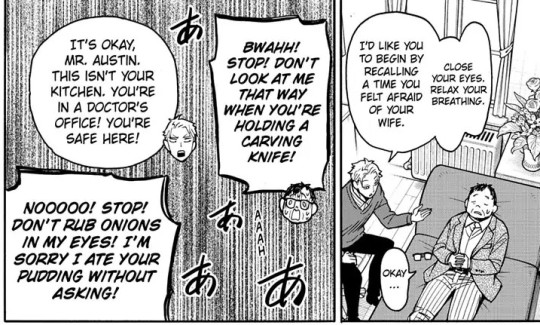
I talked a bit about divans here.
There, I mentioned that you should NEVER PUT A PSYCHOTIC PATIENT IN A DIVAN. NOPENOPENOPENOPENOPENOPE. Well, we can amplify this rule a bit and say that you should avoid the divan with any patient that has a risk of getting seriously upset, like in severe trauma.
The divan is not the only thing that could play against you if badly used. There are cases in Psychiatric Hospitals of patients getting upset because their therapists used the same clothes and hairstyle every single day for months. The point here is that, with psychotic patients and fragile psychic structures (like what happens in traumatized people), you can't use methods that require too much projection.
Also, Lottie here is not performing a Talking Cure.
The divan has been used since Freud to facilitate transference through the Free Association Method. You lay down on it and your therapist ask for whatever crosses your mind first. You don't put a content there beforehand.
(On the same line, if you're a therapist, please refrain from decorating your consultation room with motivational phrases. You're putting words in your patient's mouth before he even starts to speak)
So, it's useless to make Mr Austin lay down on a divan, only to ask him to remember a specific memory. I'd advice (Ha! The irony!) against using the divan here.
----------------------------------------------------------------------------
To finish my Two Cents, I'd like to point some positive aspects of this chapter.
It's nice that a troubled person decides to seek for help. There's still a huge stigma about men requiring mental health help, and it's a nice example to settle to portray one actually going to a Psychiatrist. Men usually struggle with their problems alone and they have it rough.
It's also nice that, in the end, Loid could help his patient. I wonder how (How?!), but it probably means that, at some point of the process, he changed his methods for the better.
And yes. Sometimes, helping one single person can change many lives. I'm honored to be able to attest to that :D
As everyone, I'd expect the logical sucession of events that could follow this chapter: Loid realizing he's got a heck of a wife compared to other marriages, appreciating Yor more, and giving us heavy smut cute TwiYor moments. But Endo has proven to be an author that doesn't like to follow logic. So, let's brace for whatever will come in two weeks.
Thank you for reading!
#spy x family#loid forger#psychiatry#psychoanalysis#sigmund freud#jacques lacan#psychotherapy#spy x family manga#sxf
391 notes
·
View notes
Text
Jacques Lacan had Venus in the 8th House
And that is quite visible in his work. Some of his quotes are shared below. These are the words of someone who must have felt the tragedy of losing a grip over their reality. Who must have lived a fantasy first and seen it tear apart later. Therefore comes the school of psychoanalysis.

What does it matter how many lovers you have if none of them gives you the universe?
Love is giving something you don't have to someone who doesn't want it.
All sorts of things in this world behave like mirrors.
His description of psychology and the unconscious touches the depths and borders of the unknown. It is the exploration of the 8th house but in a scientific way rather than spiritual or magical. Perhaps it is the closest we can get to understanding this house of astrology:
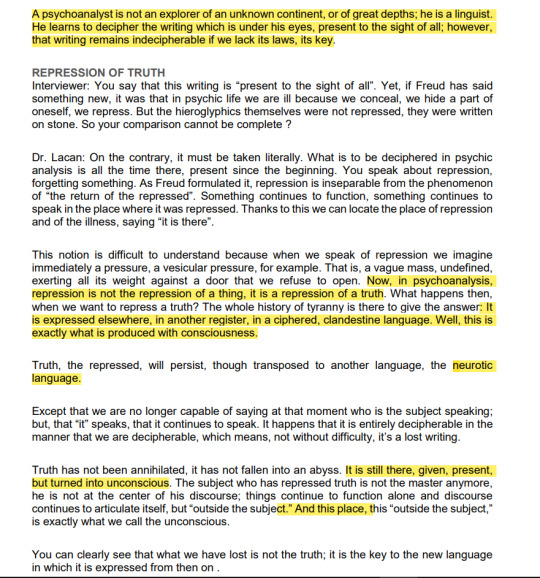
I always speak the truth. Not the whole truth, because there's no way, to say it all. Saying it all is literally impossible: words fail. Yet it's through this very impossibility that the truth holds onto the real.
I identify myself in language, but only by losing myself in it like an object. What is realised in my history is not the past definite of what was, since it is no more, or even the present perfect of what has been in what I am, but the future anterior of what I shall have been for what I am in the process of becoming.
Desire, a function central to all human experience, is the desire for nothing nameable.
As to why 8th house Venus could influence Lacanian psychology, we find its answer in the nature of this house. This excerpt is from Barbara Pijan's article on her website:
Whichever graha occupy bhava-8 become fuel for the Kuja (Mars) -Ketu magical-transformation engine of hidden and secret tantric processes in the human consciousness. Will the native become a victim of this process or an instigator of it? A long-lived and wise magician, or a tragic childhood death? A brilliant surgeon or psychiatrist? An attorney of wills and estates? Or a sorcerer, caster of curses, agent of superstitious fear and petty control? Will"self-destructive" urges be recognized as healing transformations, or will the native and-or his culture adjudge such behaviors to be undesirable?
True to this description, Lacan did indeed become a brilliant psychiatrist. If you read how he speaks of psychoanalysis, it is not merely his profession or source of income, it is rather something that has touched something inside him, that he cannot articulate but knows it is connected to psychology. How do we even know if something is scientific work and not the gibberish of a mystic who speaks whatever he wants? Anyone with planets in the 8th house or aspects to this house is bound to experience a similar psychic fate: of self-undoing and psychological analysis.


The madman is not only a beggar who thinks he is a king, but also a king who thinks he is a king.
Yet, analytical truth is not as mysterious, or as secret, so as to not allow us to see that people with a talent for directing consciences see truth rise spontaneously.
Obsessional does not necessarily mean sexual obsession, not even obsession for this, or for that in particular; to be an obsessional means to find oneself caught in a mechanism, in a trap increasingly demanding and endless.
In other words, the man who is born into existence deals first with language; this is a given. He is even caught in it before his birth.

#astrology#astro community#astro observations#astrology observations#astro notes#astroblr#astro tumblr#astrology blog#astrology notes#shadow self#8th house#sidereal astrology#sidereal zodiac#venus in 8th house
114 notes
·
View notes
Text
“The unconscious is structured like a language.”
The actual sentence is "The unconscious is fundamentally structured, woven, chained, meshed, by language."
Lacan, On nonsense and the structure of God
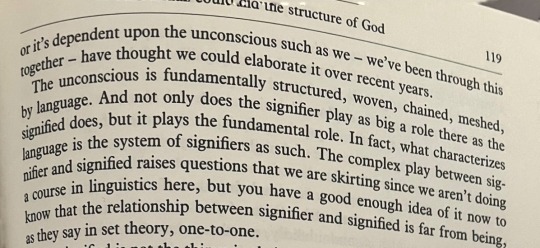
21 notes
·
View notes
Text
Lacan's point is that you can only ever have jouissance as something that has been lost it doesn't mean you had it at one point and then you lost it it means that it is always already missing
to speak to have language is to have enjoyment always already removed from the field of possibilities before you society is shored up or propped up by language the law is written down in language norms are transmitted stereotypes are transmitted mouth to mouth by language
i don't know any baby that hates black people
i don't know any racist babies and i don't know any kids that walk through the world and see people with different skin tones and think lesser of them they notice difference but skin is not yet a difference that makes a difference in the child's life
you can notice all kinds of differences the question is what differences make a difference socially speaking for something to make a difference in your life it has to be made into something more than a simple difference and that is happening through language the human experience of race i'm trying to tell you here is not just socially constructed
it is linguistically determined it is by way of language which is why it's so excellent that we're finally talking about institutionalized racism
because the primary place in which all isms are instituted is language there are so many words and expressions that if you just take a close etymological look at you'll see how they're wrapped up in the history of violence against women
black and brown bodies any minoritized figure
the rule of thumb was never just a simple
given guideline the rule of thumb described the maximum width of a stick that you could pull from a tree and beat the fuck out of your wife and children
and slaves in fact i don't even think this rule applied to slaves notice i'm not using the word fuck here to scandalize you i want to remind you that the etymological origin of the word fuck is to hit there is something inherent and violent about fucking so
the rule of thumb is a good example of this it's a really common expression that describes things that almost don't even need to be described it's just a general guideline but it has this very acute
unconscious history you see if the unconscious is structured like a language as lacan would say
i'd like to add something more to that every language also has its own unconscious that's why words matter sticks and stones may break your bones
but words can mess you up too and one of the ways they do it is by having all of this unconscious usually etymological baggage to them that we are unaware of when we use an expression like rule of thumb as you can see today i am chomping at the bit
-Samuel McCormick
7 notes
·
View notes
Text
My depression points to my not knowing how to lose... What is more, the disenchantment that I experience here and now, appears, under scrutiny, to awaken echoes of old traumas, to which I realise I have never been able to resign myself.
My depression points to my not knowing how to lose...
Nevertheless, the power of the events that create my depression is often out of proportion to the disaster that suddenly overwhelms me. What is more, the disenchantment that I experience here and now, cruel as it may be, appears, under scrutiny, to awaken echoes of old traumas, to which I realise I have never been able to resign myself. I can thus discover antecedents to my current breakdown in a loss, death, or grief over someone or something that I once loved. The disappearance of that essential being continues to deprive me of what is most worthwhile in me; I live it as a wound or deprivation, discovering just the same that my grief is but the deferment of the hatred or desire for ascendency that I nurture with respect to the one who betrayed or abandoned me. My depression points to my not knowing how to lose – I have perhaps been unable to find a valid compensation for the loss? It follows that any loss entails the loss of my being – and of Being itself. The depressed person is a radical, sullen atheist.
Julia Kristeva - Black Sun: Depression and Melancholia. Columbia University Press; Reprint edition (1989).
#lacan#psychoanalysis#unconscious#jouissance#lacanian real#freud#lacan unconscious#lacan object petit a desire#real symbolic imaginary#objet petit a#trauma#real#depression#anxiety anxious#angst#dread#loss#grief
42 notes
·
View notes
Text
Psychoanalysis and Subjectivity
youtube
"Thriller" by Michael Jackson, released in 1983, is not just a song but an iconic cultural phenomenon, with its music video setting new standards for the industry. Directed by John Landis, the video is a mini horror film featuring Jackson as a charismatic young man transformed into a werewolf alongside his love interest, played by Ola Ray. The video showcases Jackson's unparalleled talent as a performer, with his electrifying dance moves and mesmerizing presence. Its groundbreaking special effects and narrative storytelling revolutionized the music video medium, becoming an instant classic. "Thriller" remains a timeless masterpiece, captivating audiences with its fusion of music, dance, and cinema, leaving an indelible mark on pop culture for generations to come.

Sigmund Freud's essay "The Uncanny" explores the concept of the uncanny, or the eerie feeling of discomfort or unease experienced when something seems strangely familiar yet simultaneously foreign or unsettling. Freud delves into various aspects of the uncanny, including its connection to repressed desires, the repetition of specific themes or motifs in literature and art, and its association with the return of the repressed. He ultimately suggests that the uncanny arises from the revival of primitive beliefs and fears, often related to death, castration, or the supernatural, which have been repressed into the unconscious mind. This reminds me of the entire motive of the music video, which is the aspect of death. Sigmund said, “the primitive fear of the dead is still so strong within us and always ready to come to the surface at any opportunity”(Freud, 369). Death is the main factor that spikes an uncanny feeling. Our conscious mind feels eerie when we can not define whether something is animate or inanimate. This can also be viewed through the lens of Fenon’s theory because of the transformation, performance, and cultural appropriation that happens in this video. A transformation can be seen as a metaphor for the way Black individuals have been historically portrayed as "other" or different in Western society, often associated with fear and negativity. However, it also ties into Lacan’s theory of identity and self-representation. The transformation can be interpreted as a commentary on the pressure for Black individuals to conform to white standards of beauty and behavior, which makes them see themselves differently because of social interactions.
Question: How often do you see the black community transform into something other than being black, and how much of an impact do you think it has?
youtube
"Black or White" is a groundbreaking music video by the iconic artist Michael Jackson, released in 1991. Directed by John Landis, the video captivates audiences with its innovative visual effects and powerful message of racial unity. Opening with a diverse array of faces from around the world morphing into one another, the video symbolizes the interconnectedness of humanity. Jackson's electrifying dance moves and charismatic performance are showcased against a backdrop of vibrant sets and dynamic choreography. The video's climax features a montage of people breaking through barriers, emphasizing diversity, acceptance, and equality themes. Through its striking imagery and infectious rhythm, "Black or White" remains a testament to Jackson's unparalleled talent and a timeless anthem for social change and harmony.

Frantz Fanon's essay "The Negro and Psychopathology" delves into the psychological impact of colonialism and racism on Black individuals. Fanon explores how the experience of oppression and discrimination leads to a profound sense of alienation, identity crisis, and psychological trauma among Black people. Frantz Fanon said, “The Negro recognizes the unreality of many of the beliefs that he has adopted with reference to the subjective attitude of the white man”(Fanon, 115). He implies that Black individuals have internalized certain beliefs or attitudes, possibly about themselves or about the world, that are based on the perspective or viewpoint of white people. However, they have come to recognize that some of the beliefs held by white people are not grounded in reality or are false. This means that things that are said about the black community usually is said to make them feel bad. The saddest part is that it is so engraved in our system that naturally, it just reproduces.
One aspect that correlates with Fanon's ideas is Jackson's own experience of racial identity. Throughout his life, Jackson grappled with questions of race and belonging, facing scrutiny and pressure to conform to societal expectations of blackness. His changing appearance, particularly his skin color, sparked speculation and debate about his racial identity and self-image. Fanon would likely view Jackson's transformation as a manifestation of the internalized racism prevalent in societies where lighter skin is often associated with beauty and success. This also makes me think about how his skin transformation can be perceived as uncanny. The transformation can be perceived as uncanny due to its combination of familiarity and strangeness, its psychological implications, the public reaction it elicited, and its broader cultural significance. It made him seem familiar but also unfamiliar.

This scene of the music video resonates with Jacques Lacan’s “The Mirror Stage as Formative of the Function of the I” through its exploration of identity, diversity, and unity. Just as Lacan explains that the mirror stage marks a pivotal moment in the formation of the self, the video showcases individuals from diverse ethnic backgrounds, highlighting the complexity of identity formation in a multicultural world. Lacan said, "Whence it is that the relation of the individual subject to his own images is apprehended, prior to any grasp of it by the self, in a specular relation of the organism to its reality, and that, whatever may be the degree of elaboration of the imaginary function, its mediation is necessarily situated in the intersubjective dialectic"(Lacan). This statement explains that individuals have an inherent, perhaps unconscious, relationship with their mental images or representations, which reflects their perception of reality. This relationship is influenced by interpersonal dynamics and interactions, highlighting the interconnectedness between self-awareness and social experiences. Social interactions really change the way one views oneself, which sadly becomes subconscious critiquing.
Question: Do you guys view transformation as uncanny, and why do you think some people do? Do you think when you first understood your image was the only time you fully saw/respected yourself?
Sources
Freud, Sigmund. "The Uncanny." The Standard Edition of the Complete Psychological Works of Sigmund Freud, edited by James Strachey, vol. 17, Hogarth Press, 1955, pp. 219-256.
Lacan, Jacques. "The Mirror Stage as Formative of the Function of the I." Écrits: A Selection. Translated by Bruce Fink, W.W. Norton & Company, 2002, pp. 75-81.
Fanon, Frantz. "The Negro and Psychopathology." Black Skin, White Masks, translated by Charles Lam Markmann, Grove Press, 2008, pp. 99-127.
7 notes
·
View notes
Note
the whole tumblr being against freud is sooo tiring
literally! it's also so frustrating b/c it's always so obviously from people who haven't read any freud lol–and to be clear i'm not a freudian expert by any means. i've read some zizek on him and the ego and the id and his work on the uncanny and i think i understand some of his stuff, at least to the best of my ability. 1 thing about the anti-freud narrative in general is it also greatly benefits from how much of a joke the oedipus complex (omitted from freud's rewritten works, for the record) has become.
it's honestly unfortunate that people are so quick to disregard and shun concepts that they really don't understand or know much about, because the thing is, people who actually read/engage with the works of freud and lacan often really do find themselves changed. i have friends who are in similar academic spaces to me, and we've shared an experience of this realization that..."wow. He had it figured out somehow." i hate modern psychiatry and want every copy of the dsm burned to be honest, and the rejection of that mindset has come with a level of acceptance of the existence of our unconscious/our own normal neurosis–in the freudian sense of the word.
whatever. but yeah i agree it's very tiring. like what am i gonna do–confront and educate every person who comments something negative about freud on one of my classic awesome freud posts?
8 notes
·
View notes
Text
Parallels Between Kaze to Ki no Uta and Blue Velvet
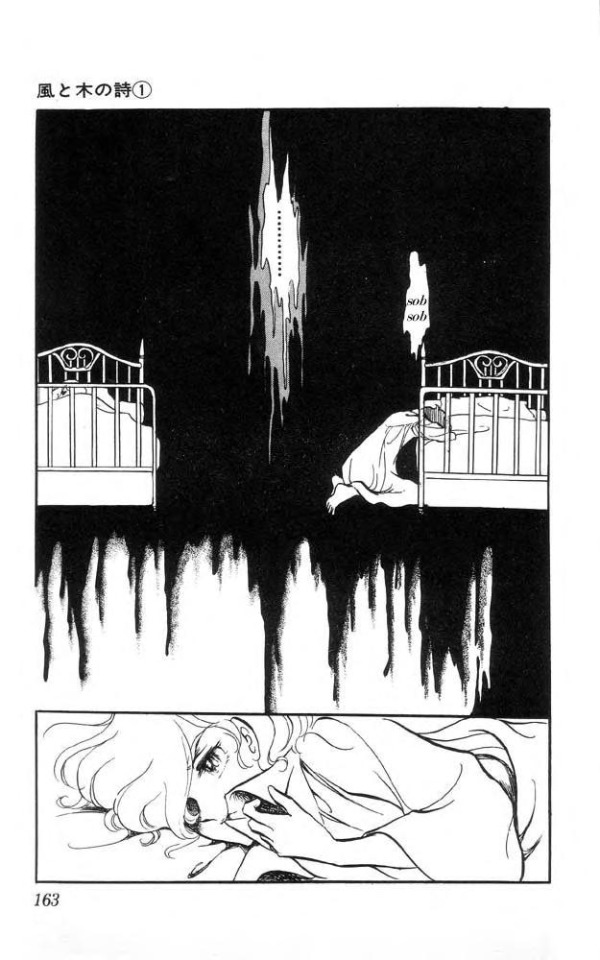
Whenever I read a manga, I take notes and such on the side as I'm reading it.
I went through those notes for Keiko Takemiya's Kaze to Ki no Uta, which was an even more rough read for me than the first time that I read Berserk, and I had a thought; the scene in the first arc which has this page is oddly similar to the scene in David Lynch's Blue Velvet where Frank Booth is introduced.
CWs; discussions of drugging, sexual violence, misogyny/patriarchy; everything that happens in Kazeki and Blue Velvet, pretty much.
What happens in each scene is very similar; a horrified protagonist powerlessly witnessing a rape in the other side of the room which they are in. The impact is very similar, one of terror and confusion with a level of the absurd. The thematics are very similar as well, with Frank Booth's sexual violence throughout Blue Velvet *always* being half an attempt at real sexual pleasure, half an attempt at forcibly asserting a position of patriarchal dominance. The parallels are much more pronounced in the OVA, since that's in a semi-cinematic medium rather than manga, but the feeling was always there.
Much of this came to mind when I thought to myself about how similar Auguste Beau and Frank Booth are conceptually. They both function as living examples of the Lacan quote which goes "masculinity is the pervert's position", they both obsessively control an otherwise picturesque rural environment through intimidation and shadow power, they both use a mix of blackmail, rape, and mercenary violence to torment and suppress those who pose a threat to them, and they both have a high level of familiarity with drugs, though Auguste doesn't have a cpap machine filled with strong drugs. I'm not sure if a parallel could be drawn between Dean Stockwell in the film and Jean-Pierre Bonnard in Kazeki, though both serve as the other half of their respective shadow tyrant's double-bind.
Since Kazeki started a full decade before Blue Velvet, the latter could not have inspired the former and I don't know if manga piracy was advanced enough for it to reach the United States for David Lynch to read after his Dune adaptation crashed and burned. However, if I was to ask this to David Lynch, he'd probably tell me that they were both drawing on the same experiences, emotions, and ultimately societal systems. I remember once joking to my therapist that the plot of Death in Venice happened three separate times in the first Drakengard game and since he's a Jungian, he joked about Yoko Taro having the same "collective unconscious connection" as Thomas Mann.
If a difference were to be drawn between Kazeki and Blue Velvet, it might be that the latter is much more optimistic.
Despite how horrific, lurid, and simply bizarre Blue Velvet is as a genre pastiche of 50's Film Noir films such as Sunset Boulevard or Double Indemnity, Blue Velvet is ostensibly a film about the hero defeating the bad guy and saving the day. It was set at a point which was deep enough into the Aeon of Aquarius that the segmentary systems of heirarchic violence which sustain patriarchy, portrayed in the film as sexual or mercenary violence going downward from a symbolic father to those who are contained within his regime, had imploded so heavily that Patriarchy was rapidly ripping itself apart and self-destroying. The film, furthermore, takes a similar position to patriarchy to what Marx is described by Bataille as having taken about Capital, where once all of its various obstructions toward Human Development are simply removed, Humanity will flourish once more.
With Kazeki, however? It's set during a time when there are some old people who were alive when Mary Wollstonecraft was still alive, when universal suffrage is many decades into the future, when the authoritarian rule of the church and the nobility is *only beginning* to be contested, when colonialism is at its highest levels of brutality (which the manga makes very clear, connecting Auguste's brother's incest and generalized sadism to his position as a colonial official in French Indochina), and in which the development of all of the forces of oppression and unfreedom present will not begin to be possible to assail until the First World War destroys their productive capabilities at least. Auguste Beau isn't as much of a cartoon villain as Frank Booth, furthermore, and has an ability to check his boundless hatred for all which is young and beautiful for the sake of self-preservation, rather than simply erupting into ultimately self-destructive violence at the slightest notice.
#kaze to ki no uta#blue velvet#surrealism#babst blue ribbon#Tumblr kept breaking when I tried to post this.#They must hate Decadent Art.#Sometimes I wish that Kazeki was as surrealistic as a David Lynch film.#Then that would just be Berserk of Evangelion though.
8 notes
·
View notes